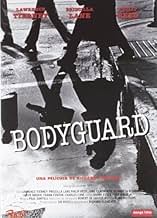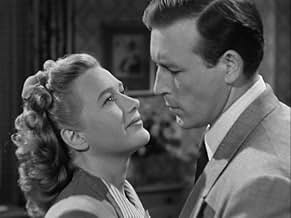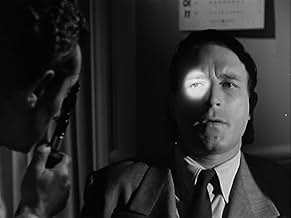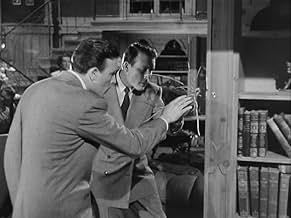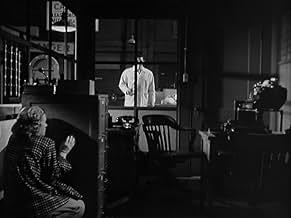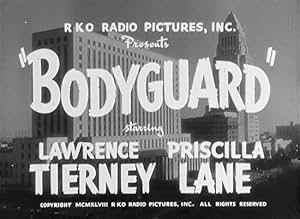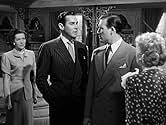CALIFICACIÓN DE IMDb
6.5/10
1.3 k
TU CALIFICACIÓN
Agrega una trama en tu idiomaAfter being fired for insubordination, homicide detective Mike Carter is hired as bodyguard by the owner of a local meat-packing plant where a meat inspector has been murdered.After being fired for insubordination, homicide detective Mike Carter is hired as bodyguard by the owner of a local meat-packing plant where a meat inspector has been murdered.After being fired for insubordination, homicide detective Mike Carter is hired as bodyguard by the owner of a local meat-packing plant where a meat inspector has been murdered.
Erville Alderson
- Adam Stone
- (sin créditos)
Bobby Barber
- Little Man in Street
- (sin créditos)
Charles Bedell
- Cop
- (sin créditos)
Claire Carleton
- Zinnia
- (sin créditos)
Russ Clark
- Cop
- (sin créditos)
Marcelle Corday
- Madalena
- (sin créditos)
David Cota
- Pachuco
- (sin créditos)
Joe Devlin
- Detective Sgt. Burch
- (sin créditos)
Dante DiPaolo
- Young Man in Police Station
- (sin créditos)
Argumento
¿Sabías que…?
- TriviaFinal film of Priscilla Lane.
- ErroresMike Carter jumps out of a car just before a train hits it. The front of the engine should read Santa Fe, but the image was reversed and says " EF ATNAS"
- Citas
Fenton: You in the meat business?
Mike Carter: In a way. I keep the meat warm. I'm a bodyguard.
- ConexionesReferences Lo que el viento se llevó (1939)
Opinión destacada
Made in 1948, Bodyguard' is the first of several effective and taut noir B-thrillers made by Richard Fleischer at the start of his career. Follow Me Quietly' and Clay Pigeon' came next, (both 1949) and finally, with increasing assurance, Armored Car Robbery' (1950) and The Narrow Margin (1952). There's a comparison to be made here between Fleischer's work and that of his contemporary Anthony Mann. Starting with Desperate' (1947) Mann founded his own directorial reputation on several effective B-thrillers around the same time, work now highly regarded among fans. Fleischer's films, though sharing many of the same qualities, are relatively less well known and await discovery. While in the 50's Mann went on to direct a great series of Westerns with James Stewart such as Naked Spur' and then to the quality epic El Cid', Fleischer's later career was workman-like, entertaining, if generally unexceptional.
Bodyguard' apparently exists in two version. There's a 75 minute director's cut' out there somewhere. The one discussed here is the original 62 minute release. I suspect that most of those missing minutes might have disappeared from the potentially gruesome meat factory finale. These are scenes which feel slightly abbreviated, but generally continuity and plot seem unimpaired from any trimming. As the then unknown Robert Altman co-wrote the screen play, it would be interesting to see what has been excised.
At the heat of the film is ex-homicide detective Mike Carter, played with stoney-eyed, rigid-backed conviction by Lawrence Tierney. The plot is the old one of the hero framed by the real villains to throw the law off their scent, and of his attempts to clear his name while on the run. Tierney (who also appeared in Reservoir Dogs' (1992) - no doubt chosen by Tarantino because of his minor noir-iconic status) had just appeared in one of the great films of the genre, Wise's Born to Kill/Lady of Deceit' (1947) when he was cast next in Bodyguard'. A legendary real life tough guy, his brawling presence dominates proceedings. As an actor he had the ability to project a dead calm, scowling brutalness - ideal for noir, a characteristic he showed beyond doubt as a superb Dillinger in the movie of the same name (1945). In the present film he is a cop at the outset, but soon loses his job after fighting with his boss - in effect turning into a private detective. Although he is hired as a `bodyguard', Carter's semi-official investigative powers, his struggle to clear his name after he is framed, as well as the pervading air of conspiracy and persecution place this clearly in noir territory. Ultimately Carter ends up protecting his own body from the manhunt and killers, rather than that of his client.
The noir style frequently brought out the best in directors of all abilities. The shooting requirements of the genre (shadow, cheap sets, anonymous location and so on) made a virtue out of low budgets. Fleischer's tough film is punctuated with some particularly effective scenes. At one point Carter is led by evidence to an opticians office. Himself seated in an examination chair for a check up, Carter quizzes the nervous eye doctor. As he questions his suspect, Carter's eye fills the screen in dramatic close up, his iris contracting under the light. The view is disconcerting as it reveals the ex-cop under a microscope, as it were, while the emotionless hard-boiled dialogue continues over the image. We are as close to the man as we can get, but his language reveals nothing.
A would-be attacker is reflected in a mirror, and a swift struggle ensues. Carter brutally subdues both men, then both he and girlfriend bluff their way past an arriving policeman to escape. There's tension, pacing and originality of staging here, enough to do justice to a bigger crime picture. Mirrors have already played a part in the plot: earlier, with calm professionalism, Carter deduced why an assassin's bullet missed Gene Dyson. The killer, he decides, had mistaken the old lady's reflection for the real thing. Later in the plot, the near perfect sight of the murdered meat inspector is the fact upon which the case ultimately turns. The equation of seeing' with comprehension' - a common conceit in noir - falls into place discreetly, without strain.
The biggest weakness of the film is the relationship between Carter and his girlfriend. Too often a compliant and docile investigative companion, and too quick to put up with the rigours involved, she lacks strength and individuality. When Carter rushes to her assistance at the end of the film (a setting reminiscent of the meat-packing plant robbery of Gun Crazy' filmed two years later) one feels she has served her only necessary purpose apart from lazily filling out his home life. With the luxury of a longer running time, she might have added another dimension to the hero. She is reduced to a plot device, a noir damsel in distress.
Bodyguard' is well worth seeking out among more obscure noirs. There are better films but the non-nonsense strengths of this production, as well as the pleasure of seeing Tierney playing a star role make it enjoyable.
Bodyguard' apparently exists in two version. There's a 75 minute director's cut' out there somewhere. The one discussed here is the original 62 minute release. I suspect that most of those missing minutes might have disappeared from the potentially gruesome meat factory finale. These are scenes which feel slightly abbreviated, but generally continuity and plot seem unimpaired from any trimming. As the then unknown Robert Altman co-wrote the screen play, it would be interesting to see what has been excised.
At the heat of the film is ex-homicide detective Mike Carter, played with stoney-eyed, rigid-backed conviction by Lawrence Tierney. The plot is the old one of the hero framed by the real villains to throw the law off their scent, and of his attempts to clear his name while on the run. Tierney (who also appeared in Reservoir Dogs' (1992) - no doubt chosen by Tarantino because of his minor noir-iconic status) had just appeared in one of the great films of the genre, Wise's Born to Kill/Lady of Deceit' (1947) when he was cast next in Bodyguard'. A legendary real life tough guy, his brawling presence dominates proceedings. As an actor he had the ability to project a dead calm, scowling brutalness - ideal for noir, a characteristic he showed beyond doubt as a superb Dillinger in the movie of the same name (1945). In the present film he is a cop at the outset, but soon loses his job after fighting with his boss - in effect turning into a private detective. Although he is hired as a `bodyguard', Carter's semi-official investigative powers, his struggle to clear his name after he is framed, as well as the pervading air of conspiracy and persecution place this clearly in noir territory. Ultimately Carter ends up protecting his own body from the manhunt and killers, rather than that of his client.
The noir style frequently brought out the best in directors of all abilities. The shooting requirements of the genre (shadow, cheap sets, anonymous location and so on) made a virtue out of low budgets. Fleischer's tough film is punctuated with some particularly effective scenes. At one point Carter is led by evidence to an opticians office. Himself seated in an examination chair for a check up, Carter quizzes the nervous eye doctor. As he questions his suspect, Carter's eye fills the screen in dramatic close up, his iris contracting under the light. The view is disconcerting as it reveals the ex-cop under a microscope, as it were, while the emotionless hard-boiled dialogue continues over the image. We are as close to the man as we can get, but his language reveals nothing.
A would-be attacker is reflected in a mirror, and a swift struggle ensues. Carter brutally subdues both men, then both he and girlfriend bluff their way past an arriving policeman to escape. There's tension, pacing and originality of staging here, enough to do justice to a bigger crime picture. Mirrors have already played a part in the plot: earlier, with calm professionalism, Carter deduced why an assassin's bullet missed Gene Dyson. The killer, he decides, had mistaken the old lady's reflection for the real thing. Later in the plot, the near perfect sight of the murdered meat inspector is the fact upon which the case ultimately turns. The equation of seeing' with comprehension' - a common conceit in noir - falls into place discreetly, without strain.
The biggest weakness of the film is the relationship between Carter and his girlfriend. Too often a compliant and docile investigative companion, and too quick to put up with the rigours involved, she lacks strength and individuality. When Carter rushes to her assistance at the end of the film (a setting reminiscent of the meat-packing plant robbery of Gun Crazy' filmed two years later) one feels she has served her only necessary purpose apart from lazily filling out his home life. With the luxury of a longer running time, she might have added another dimension to the hero. She is reduced to a plot device, a noir damsel in distress.
Bodyguard' is well worth seeking out among more obscure noirs. There are better films but the non-nonsense strengths of this production, as well as the pleasure of seeing Tierney playing a star role make it enjoyable.
- FilmFlaneur
- 8 dic 2001
- Enlace permanente
Selecciones populares
Inicia sesión para calificar y agrega a la lista de videos para obtener recomendaciones personalizadas
- How long is Bodyguard?Con tecnología de Alexa
Detalles
- Tiempo de ejecución1 hora 2 minutos
- Color
- Relación de aspecto
- 1.37 : 1
Contribuir a esta página
Sugiere una edición o agrega el contenido que falta

Principales brechas de datos
By what name was El guardaespaldas (1948) officially released in India in English?
Responda

